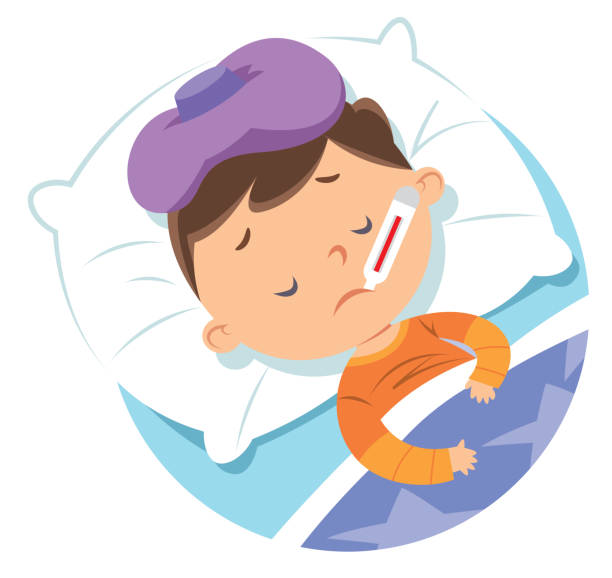Getting sick
Lesson discusses getting sick, and treatment options.

Part 1
Warm-up
Answer the questions
What did we discuss in the last lesson?
When was the last time you were sick?
Do more people get sick in the winter or the summer? Why do you think this is?
Part 2
Vocabulary
Read the word, its’ meaning, and the examples
Then make up your own sentences using the word.
Student can skip the words they already know.
catch a cold
/kæʧ ə koʊld/

to become ill with a cold
I don't usually catch a cold.
I always make sure to get enough sleep during the winter months to avoid catching a cold.
embarrassed
/ɪmˈbærəst/

feeling uncomfortable and worrying about what people think about you because of a mistake you have made or something you have done
I am so embarrassed every time I say something inappropriate.
I feel embarrassed every time I make mistakes in front of people.
immune system
/ˌɪˈmjuːn ˈsɪstɪm/

the system that protects your body from diseases and illnesses
My immune system is getting weak.
If you have a weak immune system, you will easily get ill.
diagnose
/ˌdaɪəɡˈnəʊs/

to say exactly what an illness or the cause of a problem is
After running some tests, the doctors were able to diagnose the cause of the patient's stomach pain.
He was diagnosed (as) a diabetic when he was 64.
call in sick
/kɔl ɪn sɪk/

to notify your employer that you are unable to come to work due to illness.
I can't come into the office today, I'm sorry, I'll have to call in sick.
My manager expects me to call in sick at least 24 hours in advance if I'm not feeling well.
spread
/spred/

to affect or make something affect, be known by, or be used by more and more people
We need to be careful to avoid spreading the flu virus around the office.
Cover your mouth when you cough so you don't spread your germs.
Make up your own sentences using the words.
Part 3
Grammar points
Read the grammar points & their examples. Are there any grammar points you do not know? The teacher will explain.
1. “Should/shouldn’t” for giving advice
- You should get plenty of rest.
- You shouldn’t go to the gym when you’re feeling under the weather.
- You shouldn’t skip meals, even if you don’t have much appetite.
2. “Might”, “May”, “Could” for expressing possibility
- If you don’t get regular exercise to support your immune system, you might catch a cold.
- Depending on how you’re feeling, you might need to call in sick to work tomorrow.
3. Present continuous for describing current symptoms
- My throat is really sore and it‘s becoming painful to swallow.
- I‘m experiencing waves of nausea and I’m worried I might need to lie down.
Part 4
Mini exercise
Common symptoms of being sick
What should you do/ shouldn’t do when experiencing these symptoms.
Example: When having a runny nose, you should use tissues to gently blow your nose.

:max_bytes(150000):strip_icc():focal(749x0:751x2)/man-sneeze-tout-121423-7a5fc43dfc064db58cf45a1b735a304a.jpg)
:max_bytes(150000):strip_icc()/GettyImages-1210282813-c2adb0f6218d4e8db2b82008b3f3af37.jpg)




Part 5
Dialogue Practice
Practice the conversation with teacher

Employee
Hi Math, I’m really sorry but I’m going to have to call in sick today.
Oh no, what’s going on? Are you not feeling well?

Manager

Employee
I think I might have caught a cold. My throat is sore, my nose won’t stop running, and I’ve got a pounding headache. I feel so embarrassed, but I don’t want to risk spreading this to the rest of the team.
Don’t be embarrassed, these things happen. It’s important to take care of yourself and let your immune system recover. Have you been able to see a doctor to get it properly diagnosed?

Manager

Employee
No, not yet. I was hoping to just rest up today and see if the symptoms improve.
That’s a good plan. Make sure you stay hydrated, and get plenty of rest. If the symptoms persist or worsen, please don’t hesitate to call your doctor. We want you back to full health as soon as possible.

Manager

Employee
Thank you, I really appreciate the understanding. I’ll be sure to follow your advice.
Feel better soon! Let me know if there’s anything else I can do.

Manager
Check your understanding
What is the purpose of the call from the employee?
How does the employee feel about having to call in sick?
What advice does the manager provide to the employee?
Sample answer
To inform the manager that they need to call in sick.
The employee feels embarrassed.
The manager advises the employee to rest, stay hydrated, and see a doctor if symptoms persist or worsen.
Part 6
Role-play
Make your own conversation with teacher
Imagine you’re an employee and your teacher is an employer.
You woke up this morning with a bad case of the flu. You need to call your boss to let them know you won’t be able to come into the office today.
Describe your symptoms in detail (e.g. fever, upset stomach, headache, sore throat, running nose, fatigue, nausea ) and express how you’re feeling (e.g. embarrassed, concerned about missing work).
Ask your boss what you should do to recover.
Part 7
Discussion
Let’s use the vocabulary you’ve learned during the lesson and talk about the following topics/questions freely!
Teacher helps student expand and correct the answers
How can you tell you’ve got a cold?
How often do you get sick?
What do you usually do when you start feeling sick?
How often do you visit the doctor for a check-up or when you’re sick?
Have you ever called in sick to work? How did it go?
How do you support friends or family members when they are sick?
What role does mental health play in physical sickness, in your opinion?
What are some ways that can boost your immune systems?
Do you prefer home remedies or medicine from the pharmacy?
Review
Let’s review the lesson with teacher
6 words and phrases in the lesson
Grammer points
Discussing about getting sick, covering common illnesses, symptoms, prevention methods
See you next lesson
Homework
Do homework
Describe the worst illness you have had
You should say:
- What illness did you have?
- What were the symptoms?
- How did it affect your daily life (e.g., school, work, hobbies)?
- What helped you recover?
- What did you learn from this experience?

